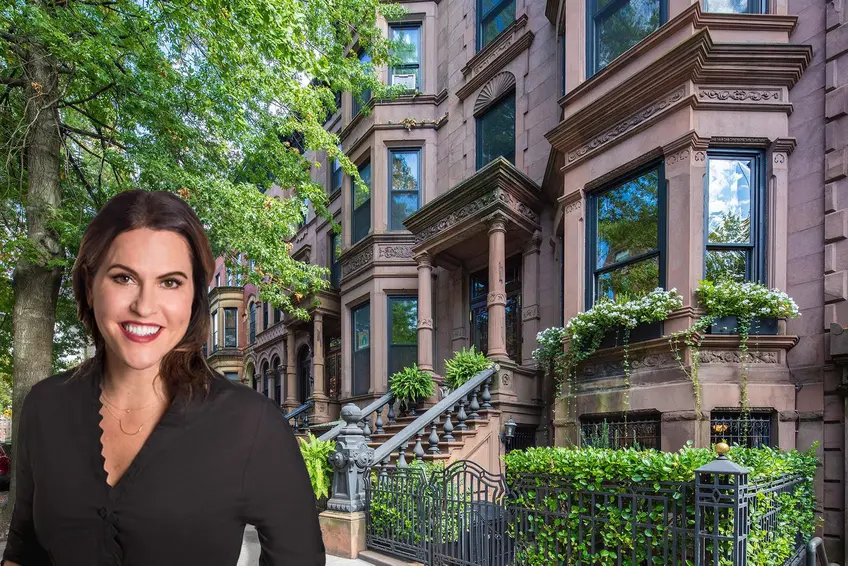 Lindsay Barton Barrett and the exterior of 43 Eighth Avenue in Park Slope (All images via Douglas Elliman)
Lindsay Barton Barrett and the exterior of 43 Eighth Avenue in Park Slope (All images via Douglas Elliman)
With over fifteen years of real estate experience and nearly a billion dollars in closed transactions, Lindsay Barton Barrett is a real estate agent at Elliman recognized by The Wall Street Journal as one of the country's top brokers. She has built a loyal and expansive client network almost exclusively from referrals and based on a reputation of consistent hard work and professionalism. With keen insight honed over her years in the business, she has the knowledge base to provide reasoned perspective and advice with a level of sophistication rare in the industry.
Uniquely bridging the gap between Brooklyn and Manhattan real estate, Lindsay is both a recognized expert in Brownstone Brooklyn neighborhoods, townhouse and new development sales, and remarkably adept at representing sellers and buyers across Manhattan. Her knowledge has been invaluable to those making the transition from Manhattan to Brooklyn, or from apartments to townhouses.
We recently caught up with Lindsay and tossed a few questions her way to provide some insight about buying a townhouse, the Brooklyn market, and unfolding trends.
Uniquely bridging the gap between Brooklyn and Manhattan real estate, Lindsay is both a recognized expert in Brownstone Brooklyn neighborhoods, townhouse and new development sales, and remarkably adept at representing sellers and buyers across Manhattan. Her knowledge has been invaluable to those making the transition from Manhattan to Brooklyn, or from apartments to townhouses.
We recently caught up with Lindsay and tossed a few questions her way to provide some insight about buying a townhouse, the Brooklyn market, and unfolding trends.
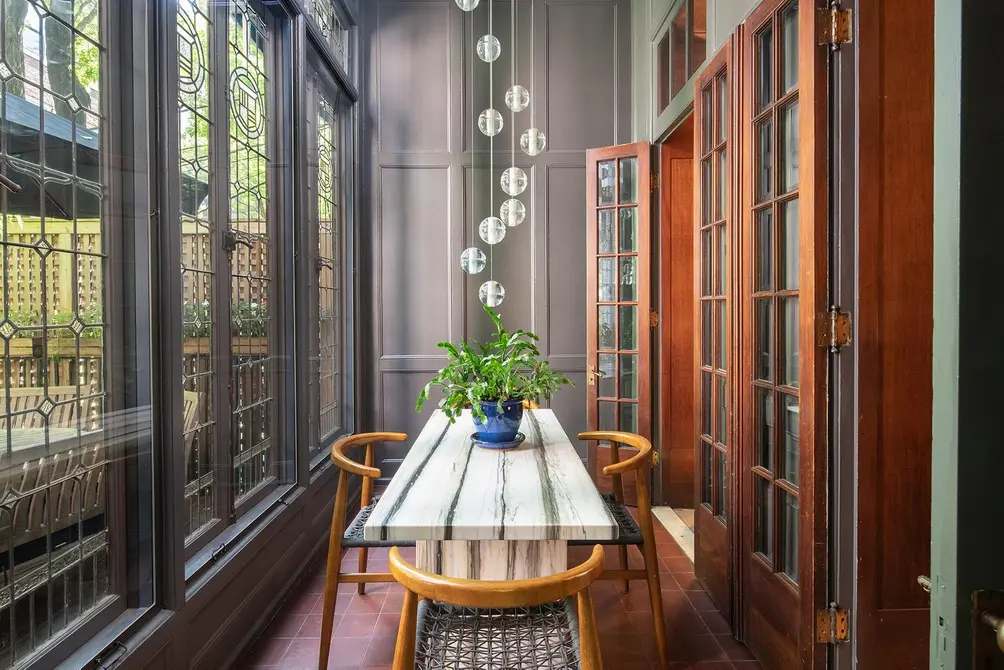 43 Eighth Avenue, #TH (Douglas Elliman)
43 Eighth Avenue, #TH (Douglas Elliman)
Can you tell me about your background and how you gained expertise in your areas of specialization?
Lindsay: I've been a real estate broker since 2002 and a lawyer before that. After practicing law for several years, I purchased an apartment in the East Village where I fell in love with the city's residential real estate market. I saw an overlap between the role a broker plays versus the role of a lawyer and found a niche in finding constructive ways of bringing people together to complete a deal.
In 2004, I moved to Cobble Hill, a move that stemmed from my previous Manhattan clients wanting to expand their search into Brooklyn. My ex-husband also grew up in Park Slope. Together, we ran a development company for several years which showed me how the sausage was made from beginning to end, so to speak. I learned a lot about zoning, the Department of Buildings, and Landmarks. That knowledge has helped me answer questions like, what can go up on the lot behind? Can I add a floor to the building? Can I change the windows? Building homes ground-up and having an in-depth understanding of architecture and design enabled me to guide people.
Lindsay: I've been a real estate broker since 2002 and a lawyer before that. After practicing law for several years, I purchased an apartment in the East Village where I fell in love with the city's residential real estate market. I saw an overlap between the role a broker plays versus the role of a lawyer and found a niche in finding constructive ways of bringing people together to complete a deal.
In 2004, I moved to Cobble Hill, a move that stemmed from my previous Manhattan clients wanting to expand their search into Brooklyn. My ex-husband also grew up in Park Slope. Together, we ran a development company for several years which showed me how the sausage was made from beginning to end, so to speak. I learned a lot about zoning, the Department of Buildings, and Landmarks. That knowledge has helped me answer questions like, what can go up on the lot behind? Can I add a floor to the building? Can I change the windows? Building homes ground-up and having an in-depth understanding of architecture and design enabled me to guide people.
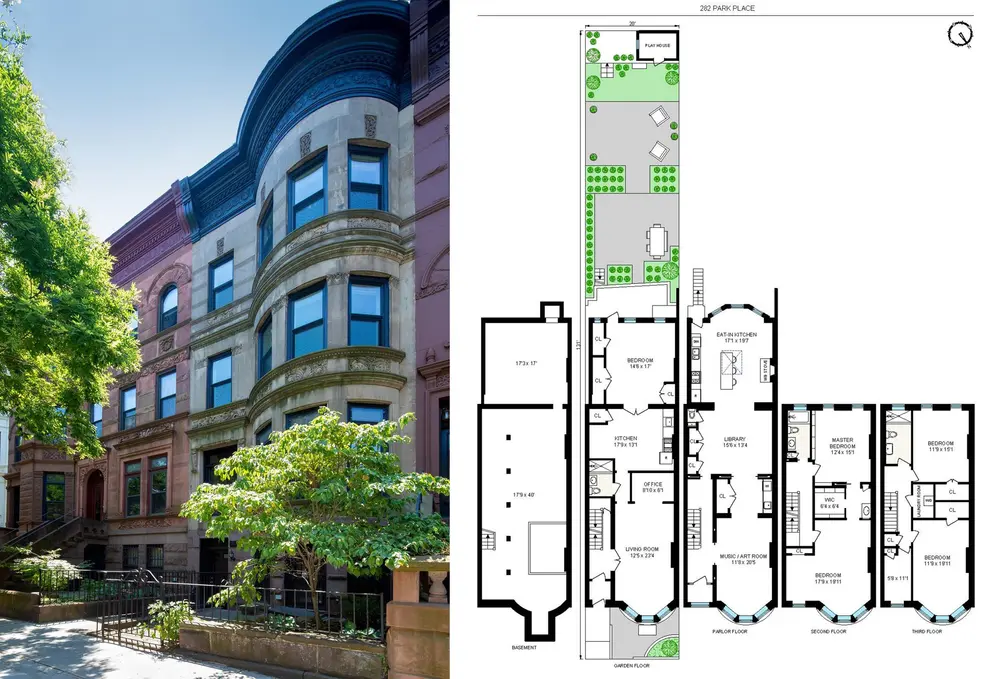 282 Park Place is a rowhouse available in Prospect Heights (Douglas Elliman)
282 Park Place is a rowhouse available in Prospect Heights (Douglas Elliman)
Of the Brownstone Brooklyn neighborhoods, which one is your favorite?
In terms of architecture, I love Prospect Heights' brownstones. They were built for professionals at the time and have gracious interiors and large backyards. The houses have deep lots, typically 130 feet. Many of the homes also have their original details intact.
In terms of architecture, I love Prospect Heights' brownstones. They were built for professionals at the time and have gracious interiors and large backyards. The houses have deep lots, typically 130 feet. Many of the homes also have their original details intact.
How important is the width of a townhouse?
Very, since its width is immutable. Not all houses are created equal - 20 feet wide is the standard but this varies between neighborhoods, and from one block to the next. The biggest houses are in Brooklyn Heights where they can be more than 25 feet wide and five stories tall. Houses 15 feet wide or less are considered narrow.
Very, since its width is immutable. Not all houses are created equal - 20 feet wide is the standard but this varies between neighborhoods, and from one block to the next. The biggest houses are in Brooklyn Heights where they can be more than 25 feet wide and five stories tall. Houses 15 feet wide or less are considered narrow.
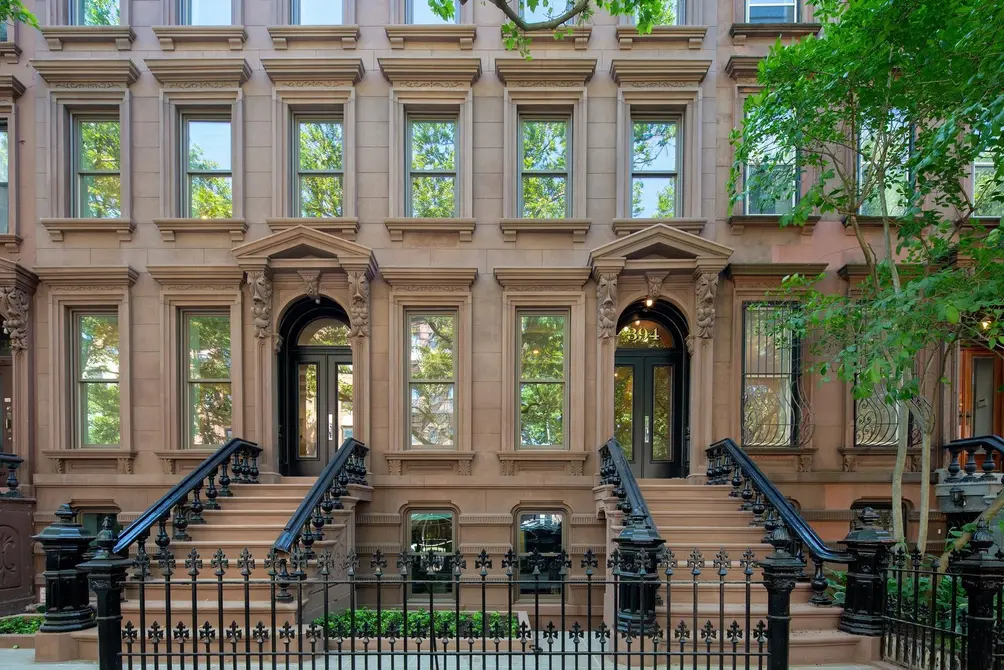 Condos in 394 Vanderbilt Avenue are double-width having been crafted within two historic Italianate brownstones (Douglas Elliman)
Condos in 394 Vanderbilt Avenue are double-width having been crafted within two historic Italianate brownstones (Douglas Elliman)
Your personal favorite detail or feature a townhouse?
I love the Old World classic details, but I also love some modern applications and ways people rethink their spaces. Staircases are definitely a place where you can do something special. You see it throughout the house and a skylight at the top can bring additional light down into the house. I've seen some owners with enough space to move the staircase off the wall and let down a shaft of natural light. Almost anything can be done with the right amount of money, and the right people.
I love the Old World classic details, but I also love some modern applications and ways people rethink their spaces. Staircases are definitely a place where you can do something special. You see it throughout the house and a skylight at the top can bring additional light down into the house. I've seen some owners with enough space to move the staircase off the wall and let down a shaft of natural light. Almost anything can be done with the right amount of money, and the right people.
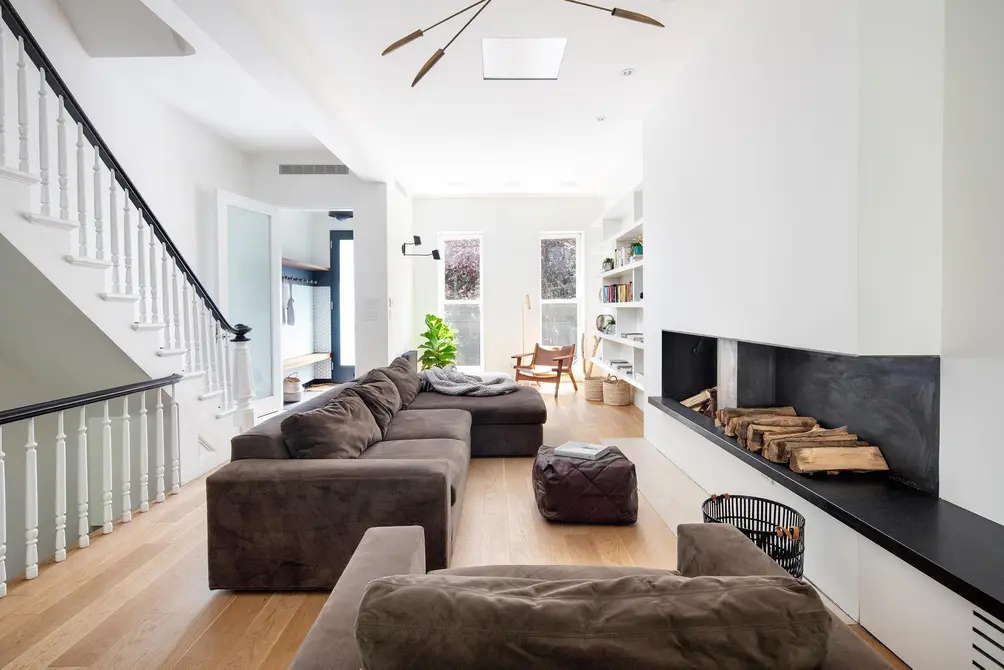 432 Clinton Street in Park Slope
432 Clinton Street in Park Slope
How should buyers address concerns and avoid potential pitfalls before purchasing a townhouse?
Get a professional inspection. Your broker shouldn't be expected to know everything to know about the workings of your townhouse. Get a lawyer and a licensed inspector. An inspector is to educate you on what you're buying. If you have a good inspector, the person will raise issues of potential concerns. They will also show and tell you what you're responsible for, such as shoveling your sidewalk after a snowstorm, and the ins and outs of lead pipes, electrical wiring, and water main connections.
Get a professional inspection. Your broker shouldn't be expected to know everything to know about the workings of your townhouse. Get a lawyer and a licensed inspector. An inspector is to educate you on what you're buying. If you have a good inspector, the person will raise issues of potential concerns. They will also show and tell you what you're responsible for, such as shoveling your sidewalk after a snowstorm, and the ins and outs of lead pipes, electrical wiring, and water main connections.
For buyers looking to renovate, what should they be aware of?
It is not easy or cheap to recreate something of the original feel. However, there are people who do some extraordinary work. Clients have flown in people from Italy. If you are trying to do a renovation that doesn't break the bank, then recreating something that is gone isn't your best bet. Installing central air conditioning in a home with expensive molding or panelization really takes very skilled craftspeople. Some of the things that people require in modern homes don't really work with original ornamentation.
The majority of people who do buy a townhouse don't do an addition, they just renovate. But for those looking to expand, they must review zoning/building code requirements and landmarks to see if it is in a historic district. Have the development rights been sold? What is the available FAR? You need to hire someone with experience and expertise to make sure you understand the potential of your property. Also, do your diligence and make sure the property is what it is being marketed as prior to closing.
It is not easy or cheap to recreate something of the original feel. However, there are people who do some extraordinary work. Clients have flown in people from Italy. If you are trying to do a renovation that doesn't break the bank, then recreating something that is gone isn't your best bet. Installing central air conditioning in a home with expensive molding or panelization really takes very skilled craftspeople. Some of the things that people require in modern homes don't really work with original ornamentation.
The majority of people who do buy a townhouse don't do an addition, they just renovate. But for those looking to expand, they must review zoning/building code requirements and landmarks to see if it is in a historic district. Have the development rights been sold? What is the available FAR? You need to hire someone with experience and expertise to make sure you understand the potential of your property. Also, do your diligence and make sure the property is what it is being marketed as prior to closing.
 Kitchen at 282 Park Place
Kitchen at 282 Park Place
What's your take on the Brooklyn market right now?
Better activity on the market, compared to the summer when we weren't allowed to show. I showed a house 15 times on [a September] Sunday. The home had been on the market for a week and we already have several offers. I'm also seeing more activity at higher price points, an area that had seen stagnation months prior.
Overall, prices have adjusted. Prices are down. But we are getting buyers who would've waited on a move but COVID expedited their plans. We are not getting a lot of buyers who never considered moving to Brooklyn before the pandemic.
Better activity on the market, compared to the summer when we weren't allowed to show. I showed a house 15 times on [a September] Sunday. The home had been on the market for a week and we already have several offers. I'm also seeing more activity at higher price points, an area that had seen stagnation months prior.
Overall, prices have adjusted. Prices are down. But we are getting buyers who would've waited on a move but COVID expedited their plans. We are not getting a lot of buyers who never considered moving to Brooklyn before the pandemic.
What are the main concerns of your current and recent clients?
There are a lot of concerns with schools. Schools impact people's location immensely in New York. The market has been unstable in recent months due to ups and downs in consumer confidence and shaky buyer sentiment over the last four years. We would naturally have some uncertainty in an election year, but COVID has put that on hyper-drive. There is constant internal questioning when buying a home and increasing the number of variables makes it harder for people to make a decision.
There are a lot of concerns with schools. Schools impact people's location immensely in New York. The market has been unstable in recent months due to ups and downs in consumer confidence and shaky buyer sentiment over the last four years. We would naturally have some uncertainty in an election year, but COVID has put that on hyper-drive. There is constant internal questioning when buying a home and increasing the number of variables makes it harder for people to make a decision.
 282 Park Place, #TH
282 Park Place, #TH
What are your thoughts on reports of New Yorkers fleeing to the suburbs?
I'm in the Seinfeld camp. New York is an ever-changing place. No one knew how it would change after 9/11 either. New York is still recognized as a world capital and will continue to be so and will adapt to change.
There are too many people for which the city is their home. It's a non-negotiable. We don't want to go to the suburbs, at least not yet. There are many life-long New Yorkers like myself who are not going anywhere. To many people who came from Manhattan to Brooklyn, Brooklyn is their interpretation of the suburbs. Everyone has their own limits and definitions. Brooklyn offers things that are different from Manhattan: more green space, slower pace, and easier access to places on Long Island. Brooklyn right now feels vibrant and it makes people feel comfortable. Moreover, buyers are able to have a home office or a backyard at a lower price point.
I'm in the Seinfeld camp. New York is an ever-changing place. No one knew how it would change after 9/11 either. New York is still recognized as a world capital and will continue to be so and will adapt to change.
There are too many people for which the city is their home. It's a non-negotiable. We don't want to go to the suburbs, at least not yet. There are many life-long New Yorkers like myself who are not going anywhere. To many people who came from Manhattan to Brooklyn, Brooklyn is their interpretation of the suburbs. Everyone has their own limits and definitions. Brooklyn offers things that are different from Manhattan: more green space, slower pace, and easier access to places on Long Island. Brooklyn right now feels vibrant and it makes people feel comfortable. Moreover, buyers are able to have a home office or a backyard at a lower price point.
 282 Park Place, #TH in Prospect Heights
282 Park Place, #TH in Prospect Heights
What would you like to see improved in New York?
I would like to see a lot more money invested in the MTA. Public transportation is integral. The buses are so slow. As someone who spends a lot of time running around the city from one neighborhood to another, I take the subway all the time and we don't have a transportation system that is commensurate with the city we live in.
I would like to see a lot more money invested in the MTA. Public transportation is integral. The buses are so slow. As someone who spends a lot of time running around the city from one neighborhood to another, I take the subway all the time and we don't have a transportation system that is commensurate with the city we live in.
Grand beyond compare, this extraordinary 23-foot-wide brownstone dazzles with impeccably restored architectural detail and of-the-moment style, just inches from Grand Army Plaza and Prospect Park. See full description, images and floor plan here.
Step into magazine-worthy interiors, and featured in the book Design Brooklyn, this stunning two-family Carroll Gardens brownstone, features an impeccably gut-renovated owner's triplex and garden rental.See full description, images and floor plan here.
 394 Vanderbilt Avenue (Douglas Elliman)
394 Vanderbilt Avenue (Douglas Elliman)
Magnificent full-floor living and a private roof deck are yours in this spectacular new-construction three-bedroom, two-and-a-half-bathroom home in coveted Fort Greene. See full description, images and floor plan here.
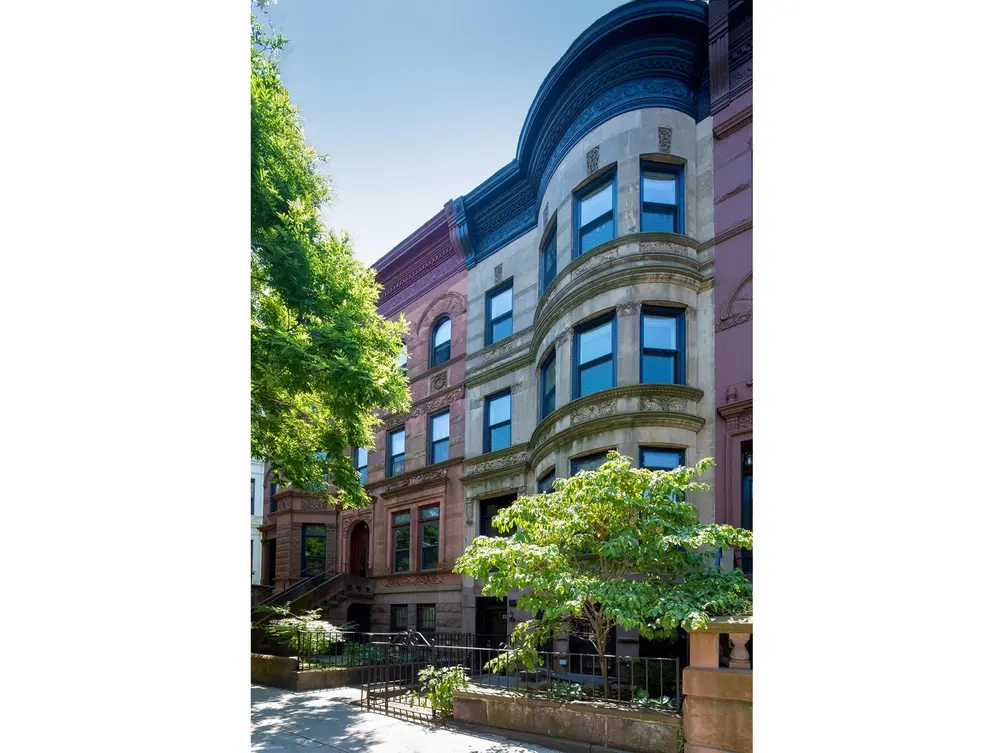 282 Park Place (Douglas Elliman)
282 Park Place (Douglas Elliman)
Simply perfection, this impeccably renovated historic townhouse features tasteful modern finishes, endless sunlight, a rambling and glorious garden, and a separate garden floor, an over-sized one-bedroom apartment, in sought-after Prospect Heights. This is one of those houses that makes you stop to marvel.
See full description, images and floor plan here.
Welcome to 222 Kane Street, a stunning four-bedroom townhouse where classic bones and modern updates create a comfortable, contemporary quality of life in coveted Cobble Hill.
This gorgeous brownstone can be entered up the classic stoop on the parlor level where full-floor formal living and dining rooms are surrounded by north and south exposures, a stately gas fireplace, and floor-to-ceiling built-ins. Classic millwork accents the soaring ceilings, and diagonal inlaid hardwood floors recall the bespoke opulence of a bygone age. A delightful rear study with garden views completes the parlor floor. See full description, images and floor plan here.
This gorgeous brownstone can be entered up the classic stoop on the parlor level where full-floor formal living and dining rooms are surrounded by north and south exposures, a stately gas fireplace, and floor-to-ceiling built-ins. Classic millwork accents the soaring ceilings, and diagonal inlaid hardwood floors recall the bespoke opulence of a bygone age. A delightful rear study with garden views completes the parlor floor. See full description, images and floor plan here.
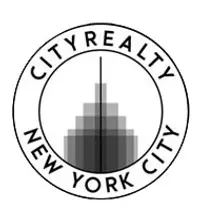
New Developments Editor
Ondel Hylton
Ondel is a lifelong New Yorker and comprehensive assessor of the city's dynamic urban landscape.

 6sqft delivers the latest on real estate, architecture, and design, straight from New York City.
6sqft delivers the latest on real estate, architecture, and design, straight from New York City.
